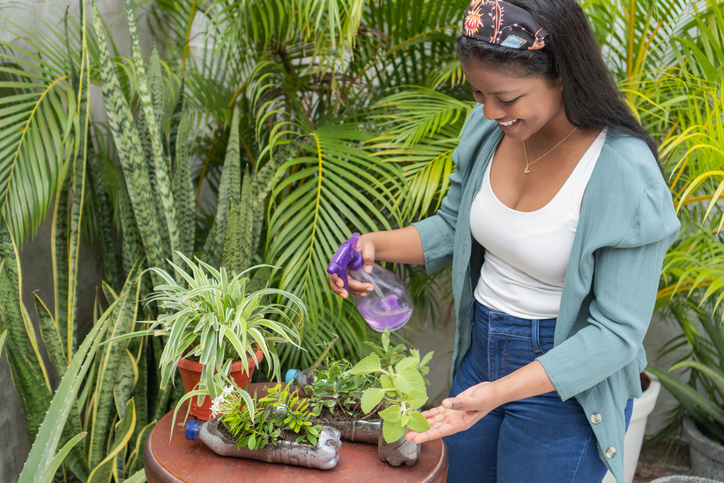5 Essential Tips For Crafting The Perfect Home Garden
From Seed to Table: 5 Pro Tips for Designing Your Dream Home Garden - Page 4
Share the post
Share this link via
Or copy link
As inflation gradually eases and the threat of tariffs on American goods looms, grocery prices remain steep. In 2024, the average cost of groceries per person was $421.05, according to Numbeo and it’s unclear when we’ll see relief. Given the expensive climate, now could be the ideal time to start a home food garden to help offset costs and enjoy fresh, homegrown produce. The process is relatively cheap and simple, too.

Source: pixdeluxe / Getty
As inflation gradually eases and the threat of tariffs on American goods looms, grocery prices remain steep. In 2024, the average cost of groceries per person was $421.05, according to Numbeo and it’s unclear when we’ll see relief. Given the expensive climate, now could be the ideal time to start a home food garden to help offset costs and enjoy fresh, homegrown produce. The process is relatively cheap and simple, too.
Here are five tips that will help you to create the perfect home garden.
1. Pick inexpensive and strong crops.

Source: Lordn / Getty
According to a 2022 article published by Glamour, the first step to achieving the perfect home garden is figuring out how much produce you can generate from your garden using the least amount of cash. Pick crops that are easy and accessible to grow like parsley, cucumbers, peppers, beets, and broccoli. If you’re looking to add fruits into your garden, melon, strawberries and blackberries are good options too, Garden Tech notes. To put things into perspective, right now on Amazon, you can purchase a pack of parsley seeds for anywhere between $2 and $5. While blackberry seed packs can range from $6 to $20.
Love MadameNoire? Get more! Join the MadameNoire Newsletter
We care about your data. See our privacy policy.
Start by purchasing seedlings that are a few weeks old. These seedlings are easier and quicker to grow, and they’re perfect for sprouting your favorite produce and veggies.
2. Use the direct sow method for better results.

Source: Westend61 / Getty
You can use the direct sow method, either planting them in a container filled with soil or directly into the ground if you have outdoor space. Janice Shipp’s Plant News, explained that the direct sow method saves time and effort. You simply plant the seeds directly in the ground and let them grow, as opposed to starting them in pots or compost containers. Planting in containers can be more time-consuming because you have to prepare the right structure, and a well-structured compost encourages better germination. Seeds in compost tend to germinate faster due to a warmer environment and more stable temperatures, but if the conditions aren’t ideal, this can lead to poor germination or even disease.
With direct sowing, there’s less root disturbance since you aren’t moving the plants around. The plants grow steadily, without the setbacks you might get when transplanting or pricking out seedlings, so they establish faster.
Direct sowing also requires less indoor space, and it’s more cost-effective and eco-friendly compared to sowing under cover. You don’t need to buy pots, trays, or compost, which reduces waste and expense.
Another advantage of direct sowing is that it can save you money. For example, a single tomato plant might cost around $6, but you can buy 30 tomato seeds for roughly the same price, Glamour noted. So, keep an eye out for seed packets labeled “direct sow” to make the most of your garden budget.
3. Find the perfect lighting and water consistently.

Source: Westend61 / Getty
Plants need sunlight, so look for an area that gets at least 6-8 hours of direct sunlight each day, Miracle Gro notes. If you’re planning on growing vegetables, make sure the spot is in a sunny location to help them thrive. Use the USDA Hardiness Zone Map to determine what crops are most likely to thrive in your region. If you’re unsure, go for native fruits and veggies that have adapted to your environment and require less care.
Watering is one of the most important aspects of garden care, but it’s also easy to get wrong. Different crops have different water requirements, so it’s important to know how much water each crop needs. Overwatering is just as harmful as underwatering, leading to root rot and other problems.
Water deeply and less frequently, rather than giving your plants small amounts of water every day. This encourages roots to grow deeper, making the plant more drought-resistant. A soaker hose, watering flower pot, or drip irrigation system, if you have the extra cash, is a great way to water your garden efficiently.
RELATED CONTENT: Plant Life: Peep The Benefits Of Indoor Plants And The Easiest Ones To Maintain
4. Tend to your soil regularly.

Source: Westend61 / Getty
Soil health is the foundation of any thriving garden, and ongoing care is essential to keep things growing strong. Be sure to regularly deadhead (remove faded or spent ends) to promote new blooms. Pruning is another vital task that encourages healthy growth, helps shape plants, and removes any dead or damaged branches.
Always use clean, sharp tools when pruning to prevent injury to the plant. Also, regularly inspect your crops for dead, diseased, or damaged branches and remove them to maintain overall plant health.
While some insects are beneficial to your garden, pests can wreak havoc and stunt the growth of your crops. Keep a close eye on your plants for signs of trouble, such as holes in leaves, yellowing, or wilting. The good news is, there are plenty of natural, eco-friendly methods to keep pests in check without resorting to harmful chemicals.
You can also use natural pesticides, like neem oil or insecticidal soap, to keep unwanted bugs out of your garden and that won’t harm the growth of your fruits and veggies, according to Eat Right. Neem oil works as a natural repellent and disrupts the life cycle of insects, while insecticidal soap targets soft-bodied pests like aphids and spider mites. Both are safe for most plants and a great alternative to harsh chemicals.
Alternatively, you can invite beneficial insects into your garden, like ladybugs, which feast on aphids and other pests.
5. Timing is everything.

Source: Sirlenys Paut / Getty
The secret to successful gardening often lies in perfect timing. Frost can be particularly harmful to young plants, so it’s crucial to wait until the weather is consistently warm before planting or transplanting. In most cases, the average date of your last spring frost marks the official start of the growing season, while the first fall frost indicates when it’s time to wrap things up.
Check the maturity date listed on the seed packet. To determine the best planting time, subtract the number of days to maturity from the first expected fall frost date. Use the National Gardening Association’s planting calendar or simply search your area’s average first and last frost dates to avoid planting too early or late. Timing your planting can prevent damage and give your plants the best chance to thrive.
RELATED CONTENT: Tales From TikTok: Diabolical Dumb Cane Plant Used During Slavery As Punishment For Enslaved Africans
Related Tags
home-

Vontélle Eyewear Founders Score History-Making Licensing Deal With Paramount
-

She Tried It: Ivy Park Drip 2 and 2.2 Black Pack
-

My Husband And I Attempted To Have A Creative Date Night At Home -Without A Babysitter - Here's How It Went
-

The Ozempic Side Effect No One Saw Coming — And It’s Showing Up On Your Head



